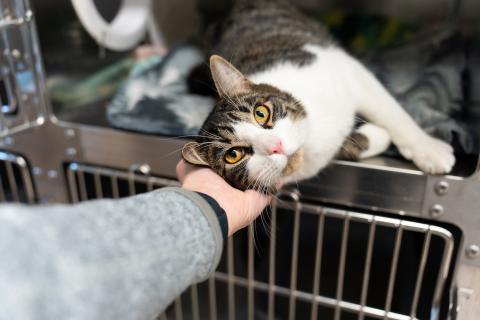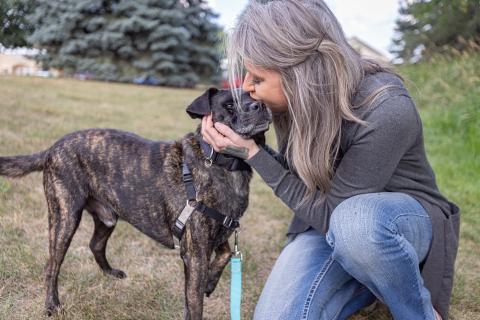
Just like cats and dogs, bunnies provide great companionship. In addition to being downright adorable, they can be affectionate, playful, and full of personality. People have described their pet rabbits as funny, sweet, adventurous, and even dramatic.
While rabbits may be small and quiet house pets, they require attention, care, and love just like other companion animals. They’re as much of a commitment as other household pets, so it’s important to understand what it means to adopt a floppy-eared friend.
Curious about what it’s like to have a rabbit as a pet? Keep reading!
Still not sure which critter is right for your family? Read about the differences between owning guinea pigs, hamsters, and rabbits to help you make the best decision.
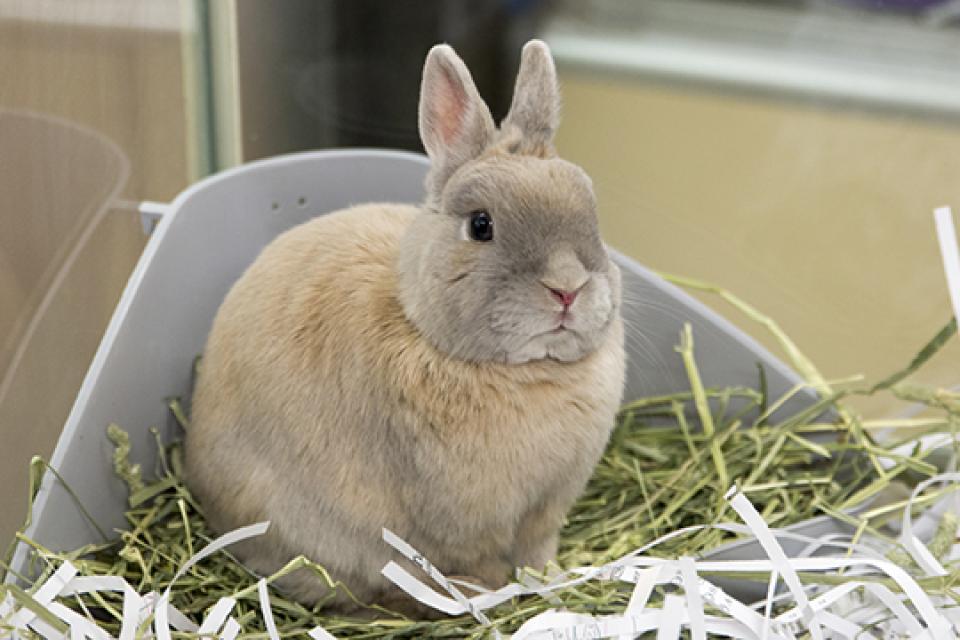
1. Rabbits require regular attention and routine veterinary care like all pets
You may have heard that rabbits make great starter pets. While it’s true they’re small and quiet, they require attention, resources, and a financial commitment just like other animals.
For instance, a rabbit’s housing needs to be cleaned daily and spacious enough to accommodate their food, litter, toys, and shelter.
They also need enough room and opportunity to run and play, require regular nail trims, and — like all pets — need to visit the vet at least once per year.
It’s important to mention that not all veterinarians have experience working with rabbits, so you may want to identify a local specialized rabbit vet or an exotic vet before you acquire a rabbit.
On the other hand, bunnies can be trained to use a litterbox, which makes cleaning up after them more manageable. They can keep their own teeth clean by chewing the toys you provide. They also don’t need flea/mite preventative or many vaccines (unless you plan to take them outside or to socialize).
Indoor rabbits live 10-12 years, and need unlimited access to water and hay/grass. Learn more about bunny basics including housing requirements, diet, and exercise.
2. Many bunnies enjoy cuddles and affection
You can bond with your bunny by relaxing at home and petting them quietly. When they’re enjoying a good cuddle, they’ll “chatter” by clicking their teeth together. Bunnies are super-soft, and many will love cuddling with you as much as you love cuddling with them.
Once a bunny is comfortable in their new home, they may claim you as their own by rubbing their chin on you to mark their territory. They might even groom you with little bunny licks to show you love!
But remember, all rabbits are unique. Some of them may loathe cuddling and prefer their independence over being picked up, so be sure you’re prepared in either scenario — especially if you have children.
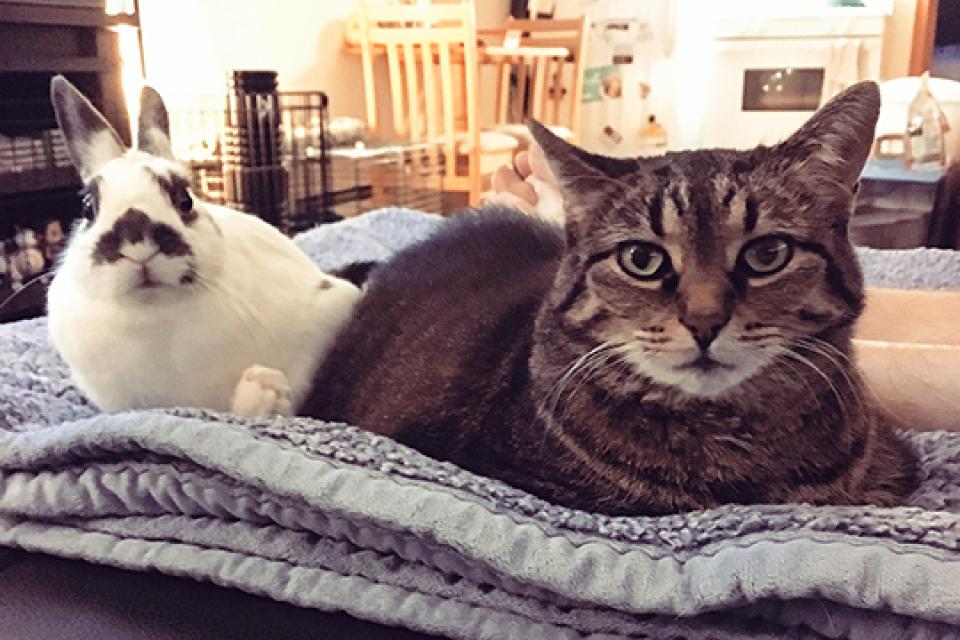
3. Bunnies are social creatures
Rabbits are highly emotional and typically do best when kept in pairs. If you already own a rabbit and are looking to add another to your household, it’s important to find the right match. Some rabbits will get along instantly while others might never learn to enjoy each other’s company.
Rabbits can form a special bond that will last a lifetime, but like all animals that cohabitate, it takes time and patience to get it right. Learn more about bunny bonding.
If you don’t currently have a rabbit you might consider adopting a bonded pair, which will provide each with the companionship they crave and have already developed together.
Even if you prefer to be a one-bunny home, it’s super important to sterilize your rabbit. Spaying and neutering reduces risk for cancer and other complicated health issues. It also leads to a longer life and better manners for your pet.
Bunnies can be a great addition to a household with other pets. Keep in mind, slow introductions can mean long-term harmony for your pets.
VIDEO: Most people are familiar with the dog park, but have you ever heard of Hoppy Hour before? Watch two minutes of total cuteness now. (Hoppy Hour at our Golden Valley shelter was paused at the beginning of the pandemic, and though we still partner with the Minnesota Companion Rabbit Society, this rabbit socialization event is no longer hosted at AHS.)
4. Bunnies are active and love to explore
Bunnies love to explore their surroundings and can be goofy and playful. To satisfy their natural curiosity, rabbits should be allowed several hours of daily exercise and enrichment outside of their cage (don’t forget to bunny-proof your home!) and be offered toys and treats.
Having more than one bunny means constant entertainment. They gain confidence when they’re around each other and are more adventurous and willing to try new things among their bunny friends. Check out Hoppy Hours, which is a fun way to socialize your bunny.
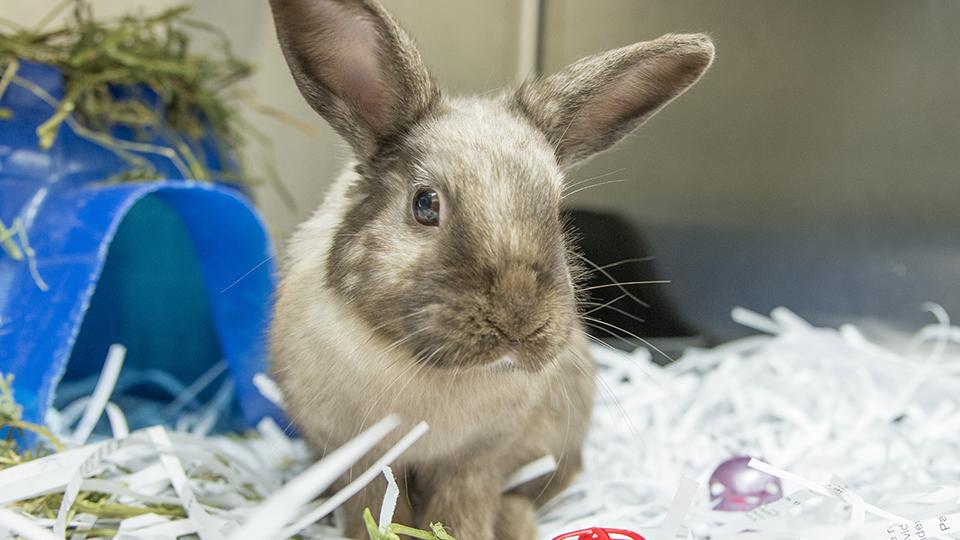
Tips from experienced rabbit parents
Want more intel on these fluffy pets? We asked current rabbit enthusiasts for their best advice for new bunny parents and here’s some of what they shared:
- Provide appropriate toys for them to chew on (just like puppies) and bunny-proof areas of your home where they’ll be allowed to roam.
- Each and every bunny has their own personality and it might take some time to see it. Review basic bunny mannerisms to better understand what your bun is trying to tell you.
- Bunnies are social so enjoy the company of another rabbit, but they tend to be particular about their friends. They also have a lot of personality, so don't expect every rabbit to be like a cuddly stuffed animal. Some rabbits don't enjoy being held, while some might.
- Rabbits can do puzzles and agility, just like tiny dogs! They need just as much socialization and enrichment as other pets.
- They need clean pens daily and need immediate vet attention if showing any signs of illness.
- Learn to how to properly hold a rabbit. Their spine needs support. Also, look around your area for an exotic rabbit-savvy veterinarian. Not all vets work with rabbits.
- Spay/neuter can improve chewing habits, spraying, and aggressiveness.
- Hoppy hour (through Minnesota Companion Rabbit Society) is a fantastic way to get our bunnies out, socialized and have fun.
- If they had the dexterity they would be online ordering stuff from Amazon. They are wicked clever. Also, if you feed them dill they smell like a pickle when they kiss you.
Are you ready to welcome a bunny into your home?
Get to know available bunnies at AHS and learn more about caring for rabbits.
And if you’re not quite ready to adopt a bunny but you want real-life experience caring for one, consider signing up to foster with the Minnesota Companion Rabbit Society (MCRS).
Fostering is incredibly rewarding and helps rabbits on their journey toward adoption. MCRS also offers a free class all about bunny basics that might help you determine if a rabbit is the right pet for you.
Sign up for AHS email
If you found this article helpful and want more information about animals and pet parenting, sign up for email from AHS. You'll receive behavior tips, stories about adoptable animals, and more!
